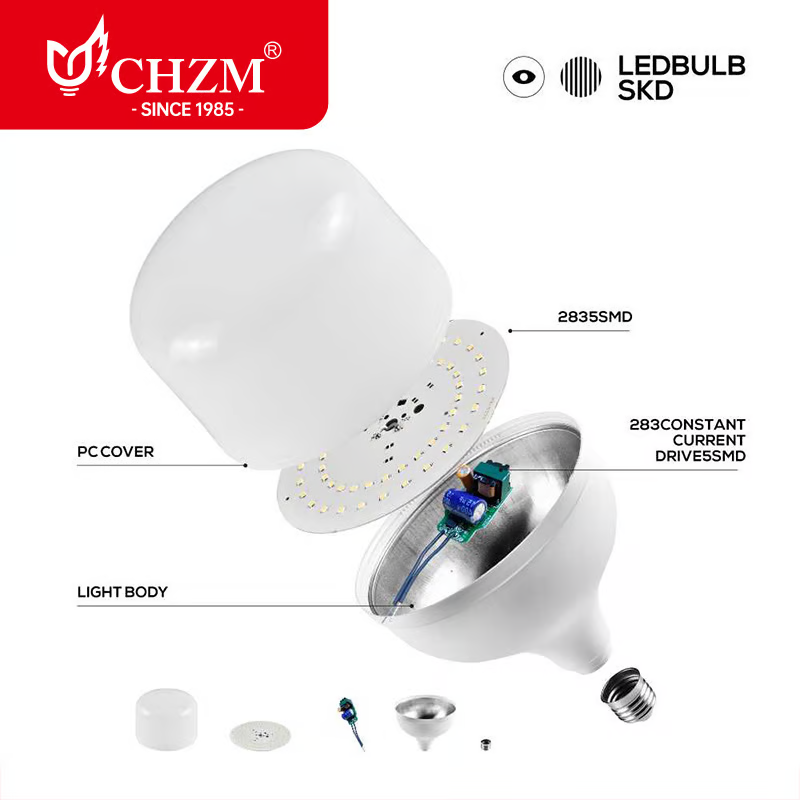Introduction
LED bulbs have become increasingly popular in recent years due to their energy-saving properties and long lifespan. However, one question that is often asked is whether LED bulbs get hot. In this article, we will explore this topic in detail to give you a better understanding of LED bulbs and their heating capabilities.
How do LED bulbs work?
LED bulbs produce light through a process called electroluminescence. This means that they use electrical currents to excite electrons in a semiconductor material, causing the electrons to release energy in the form of light. Unlike traditional incandescent bulbs, which emit light as a byproduct of heating a filament, LED bulbs don't rely on heat to produce light.
Do LED bulbs emit heat?
While LED bulbs don't emit heat as a byproduct of producing light, they do still produce some heat. However, this heat is minimal compared to other types of lighting, such as incandescent bulbs or halogen lights. LED bulbs are designed to be highly efficient and convert most of their energy into light rather than heat.
How hot do LED bulbs get?
The amount of heat produced by an LED bulb depends on its wattage and the specific design of the bulb. However, in general, LED bulbs operate at much lower temperatures than other types of lighting. A typical LED bulb might reach a maximum temperature of around 50-60 degrees Celsius, which is much cooler than incandescent bulbs, which can reach temperatures of over 200 degrees Celsius.
Are LED bulbs dangerous?
LED bulbs are generally considered safe to use and pose no significant danger. They are designed to be cool to the touch and are not likely to cause burns or fires, even if left on for long periods. However, it's worth noting that like any electrical appliance, LED bulbs can be a fire hazard if they are damaged or used improperly. It's important to follow manufacturer instructions and only use bulbs designed for the specific type of socket or fixture.
Do LED bulbs require heat sinks?
Unlike some other types of lighting, LED bulbs don't require heat sinks to dissipate heat. This is because LED bulbs are designed to generate minimal heat in the first place, and any heat that is produced is typically dissipated through the bulb's casing. However, some high-intensity LED bulbs might require additional cooling mechanisms, such as heat sinks or fans, to prevent overheating.
Can LED bulbs melt plastic?
LED bulbs are unlikely to melt plastic, as they produce relatively little heat. However, it's worth noting that some types of plastic can be sensitive to heat and might become deformed or damaged if exposed to high temperatures for long periods. If you're using LED bulbs with plastic fixtures, it's important to make sure that the fixture is rated for use with LED bulbs and can withstand any heat that might be generated.
Do LED bulbs get dimmer when they get hot?
LED bulbs are designed to maintain consistent brightness even as they heat up. Unlike incandescent bulbs, which become dimmer as the filament heats up and potentially burns out, LED bulbs don't suffer from this issue. However, it's worth noting that some low-quality LED bulbs might show signs of color shifting or flickering if they become overheated.
Do LED bulbs give off UV radiation?
Unlike some other types of lighting, such as fluorescent bulbs, LED bulbs don't emit significant amounts of UV radiation. While some UV radiation might be produced by the semiconductor material in the bulb, this is typically blocked by the bulb's casing or lens.
Can LED bulbs catch fire?
While LED bulbs are generally safe to use and don't pose a significant fire risk, it's important to take precautions to prevent any potential hazards. For example, you should always use bulbs that are rated for the specific type of fixture or socket, and avoid using damaged or improperly installed bulbs. Additionally, it's important to make sure that any electrical wiring or fixtures associated with LED bulbs are in good condition and up to code.
Conclusion
In summary, while LED bulbs do produce some heat, it's minimal compared to other types of lighting. LED bulbs are generally safe to use and don't pose a significant danger of fire or burns. However, as with any electrical appliance, it's important to follow manufacturer instructions and take precautions to prevent hazards.

